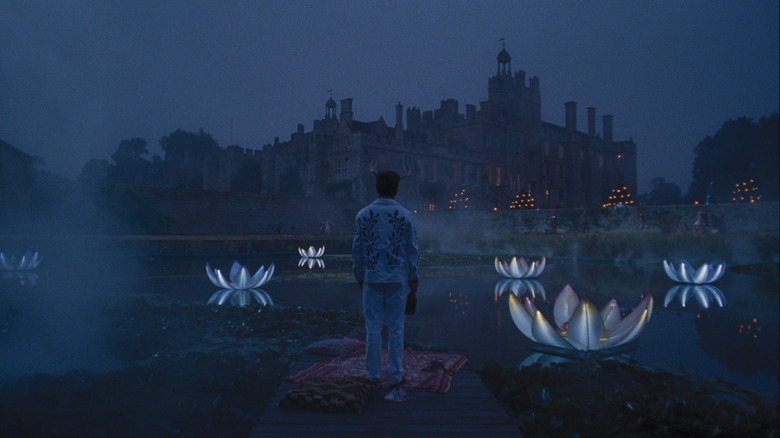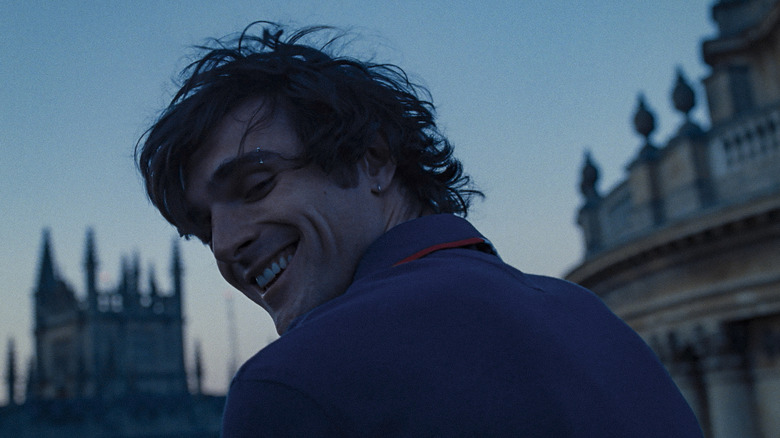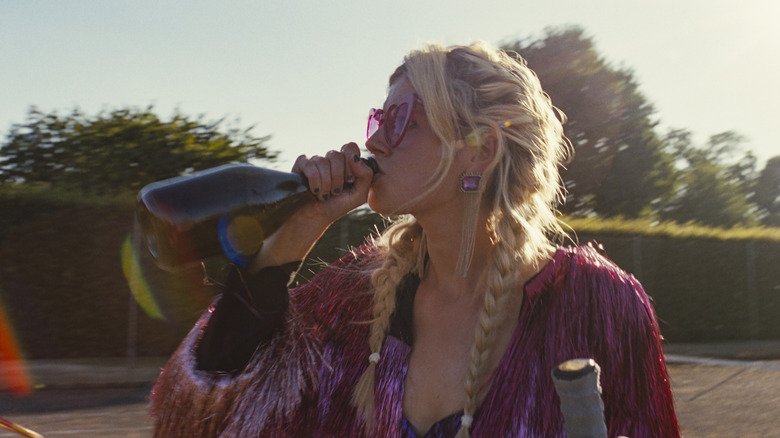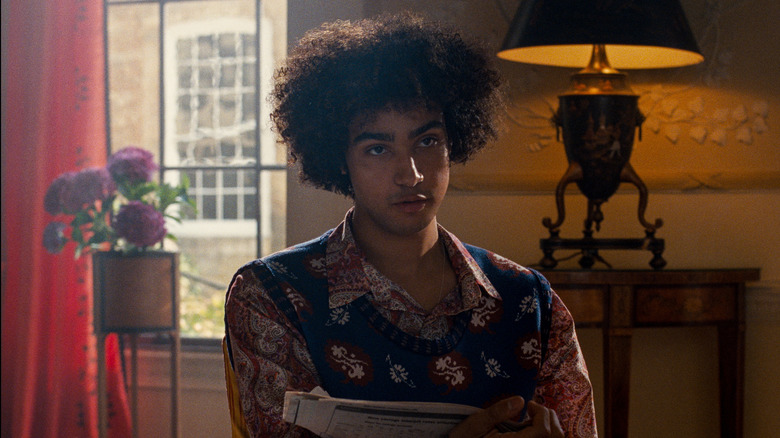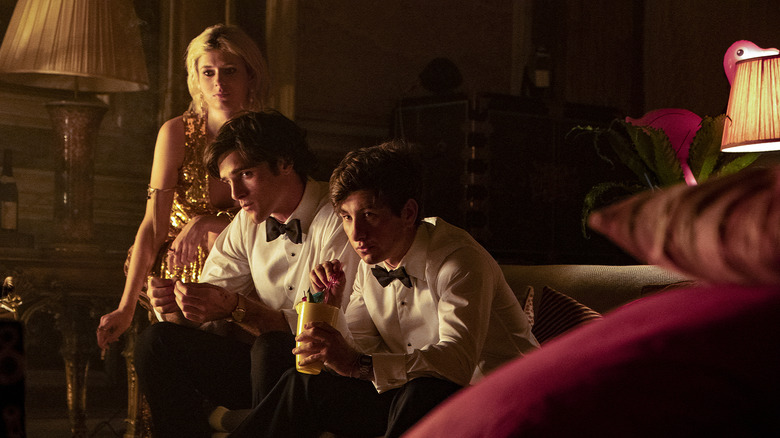Saltburn Ending Explained: Love Hurts
Emerald Fennell's sophomore feature, "Saltburn," plays like a gothic romance. There's sex, there's intrigue, and eventually things turn to murder. As our own Jacob Hall said in his review, "it's one of the bleakest films of 2023, and a real bad time at the movies."
This is a film full of twists and turns, one that plays with the particulars of British class, and a film where Barry Keoghan essentially plays a hornier and queerer Tom Ripley.
Much like "Promising Young Woman," Fennell's "Saltburn" ends very much open to interpretation, with a finale that offers as many answers as it does questions. This is a psychosexual thriller that is often disturbing, quite horny, and features one of the best villains of the year.
Whether you are confused about the ending or you simply want to check out another read on Oliver's master plan, here's what happens at the end of "Saltburn" and what it means.
What you need to remember about the plot of Saltburn
"Saltburn" follows Oliver Quick (Barry Keoghan), a young man studying at Oxford in the mid-'00s. Coming from a low economic class and having no friends, Oliver becomes rather infatuated with Felix Catton (Jacob Elordi) a posh and quite popular fellow student. After becoming friendly at university, and upon learning that Oliver's alcoholic father is dead and he is adamant about returning home to his addicted mother, Felix invites his new friend to spend the summer at his family's lavish estate, Saltburn.
Immediately, Felix's mother Elsbeth (Rosamund Pike), and anorexic sister Venetia (Alison Oliver) become utterly fascinated with Oliver and his depressing life as a normal person. Meanwhile, Felix's cousin Farleigh (Archie Madekwe) mistrusts Oliver and just waits for the day when Felix will tire of him and drop him like he did the last friend he brought home for the summer. Still, the kids all get along eventually, enjoying naked sunbathing, and cute-and-very-'00s readings of the latest "Harry Potter" book.
Things change when Felix decides to surprise Oliver by taking him to visit his mom, only to discover Oliver's truth. Turns out, his dead father is very much alive, and living a regular life with his non-addict wife in a nice little suburban house.
What happened at the end of Saltburn?
Furious, Felix stops talking to Oliver, who becomes resentful toward the object of his obsession — we're talking drinking bathwater obsessed. Things come to a boil during Oliver's "A Midsummer Night's Dream" themed birthday party, where Oliver tries to declare his love for Felix just as he is having sex with a girl.
The next morning, Felix is found dead, and the family is utterly destroyed and broken. Oliver has done enough manipulating on Elsbeth that she now trusts him more than her family and all but begs him to stay, as she and her husband try to act like nothing happened. Of course, Venetia and Farleigh suspect the truth. This means Farleigh has to go, and he soon gets mysteriously kicked out of the house for supposedly trying to sell family heirlooms. Then Venetia kills herself out of guilt. As for Oliver, he tries to have sex with Felix's grave right after the funeral.
Eventually, Elsbeth's husband Sir James (Richard E. Grant) talks Oliver into leaving the estate. Cut to about 15 years in the future, around COVID time, and Oliver finds out that Sir James has died of an illness. He oh so happens to run into Elsbeth, who invites him back to Saltburn before eventually falling ill herself — but not before she signs everything over to Oliver.
And so we get a rather unnecessary yet still delightfully sick and cool sequence revealing Oliver's Bond-villain masterplan. Turns out, he caused everything to happen, from Venetia's death and Farleigh's expulsion to Felix's death and even the initial bike accident that led to the two boys meeting. The film ends with Barry Keoghan's Oliver dancing around the house completely naked, to the tune of "Murder on the Dancefloor."
What the ending of Saltburn means
Oliver's confession is what makes this more than just a gothic romance or a psychosexual thriller. It turns "Saltburn" into "Get Out" but if the family was right, or "Parasite" but the rich family were simply victims.
This is what makes or breaks the film. Oliver's plans and turn to sheer cruelty don't fully seem supported by the rest of the film. Before the big reveal, "Saltburn" did actually make sense as a British version of "Parasite," a movie that has a young man conning his way into a higher status by exaggerating his struggles, while another man condescendingly offers charity to those less fortunate than him, only to treat them as pets. By making Oliver an actual killer, the film ends up almost betraying the eath-the-rich class commentary it toyed with throughout its runtime. The rich people were right to mistrust Oliver. He was a monster. He did not kill people out of a desire for Oliver, but because he just wanted a nice, rich house.
Still, that dance scene at the end is quite entertaining and a jolt of energy to end this cruel and messed up film.
What the director of Saltburn had to say about the ending
When /Film's Jacob Hall asked Emerald Fennell about that final dance sequence, she said it was always part of the script and meant to be "the inverse of Felix's tour" around the house from early in the film.
According to Fennell, the scene was meant to be both a territorial claim, but also a scene that "needed to feel like post-coital and joyful." The aim was to make the audience feeling "shaken up and complicit and thrilled." She continued:
"It needed everyone at the end to be like, 'Take them, take them all down.' 'Kind Hearts and Coronets,' all of those graves, just boom, boom, boom. Just be like, 'Okay, why not? Why not?' And so it needed to be jubilant, and I thought [the song] 'Murder on the Dancefloor' was just the perfect amount of camp and self-aware versus an actually joyful and thrilling."
Speaking to Vogue, Fennell described the movie as being "about first love." It's about our fetishization of country houses and titles, both in the U.K. and even in America, with the filmmaker drawing a comparison between the titular Saltburn manor and the Hamptons. "I'm utterly obsessed with how we relate to things that we want and desire and also kind of hate and know are unattainable — things that we know will never love us back, whether that's a person or a house or a culture."
